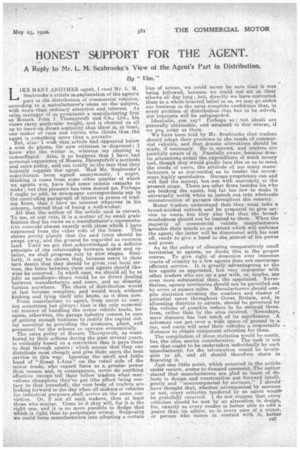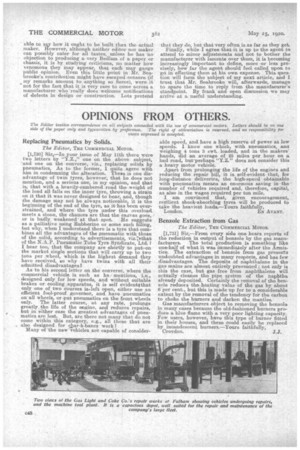HONEST SUPPORT FOR THE AGENT.
Page 21

Page 22

If you've noticed an error in this article please click here to report it so we can fix it.
A Reply to Mr. L. M. Seabrooke's View of the Agent's Part in Distribution.
By " Vim."
LiKE MANY ANOTHER agent, .I read Mr. Li M. Sealorooke's article in_e,,xplanation of the agent's . part in the distribution of commercial vehicles, according to a matmea.cturer's ideas on the subject, with more than ordinary attentiori and interest. • As sales manager. of so prominent a rnansifacturing firm as • Messrs. John. 1. Thornyeroft and ,Co.s Ltd., his views carry particular weight, and it cheesed us all. up to learn on.direct autherity that there is; at least., • one maker of vans and lorries who thinks that the agent is something more than a parasite. But,alas I Wieh that article had appeared below .a norn de plume, for now criticism is disarmed; I know who the writer ie, whereas my identity is camouflaged. Also, it so happens • that I have had personal experience of Messrs. Rhornyctoft's methods and sales policy, and can testify to the fact that they. honestly support -theagent. Had Mr. -Seahrooke's contribution been signed anonymously, I might. thinking it came from some other quarter of which we agents wet, have had some caustic remarks to make; but that pleasure has been denied me. Perhaps I ought to add,as newspaper correspondents say in the concluding paragraph of letters in praise. of trading firms, that I have no interest whatever in his concern, beyond that of being a well-wisher.
All that the author • of the article said is correct. To me, at any rate, it is a matter of no small gratification that his viewe as a. manufacturer's representative coincide almost exactly with those whioh I have
expressed from the other side of the 'fence. This shows pretty plainly that the said fence should be swept away, and the ground be regarded as common land. Until we get that acknowledged as a definite principle of the relationship between maker and retailer, we shall progress only by slow stages. Similarly, it may be shown that, because users in their turn desire that they should be given real local service, the fence between them and agents should likewise be removed. In which case, we should all be as jolly as sandboye—there would be no direct dealing betweenmanufacturers and users, end no dissatisfaction anywhere. The chain of distribution would at last become complete, paid would work without kinking and tying itself into knots, as it does now.
From manufactuer to agent, from agent to user ; not sometimes but always: that is the only economical manner of handling the motor Vehicle trade, because, otherwise, the garage industry cannot be sure of getting enough business to justify the capital outlay essential to providing the premise; plant, and personnel for the, scheme to operate economically.
The sales policy of Messrs. Thornycroft, as manifested by their actions during the past several years, is evidently based on a conviction that it pays them to deal through agents ; which means that they can distribute most cheaply and give their users the best service in this way. Ignoring the small a-nd futile band of "Great ITAms" on the retail side of the motor trade, who regard force as a greater power than reason and, in consequence, never do anything effective except tell their fellow traders what marvellous champions they've got (the effect being contary to that intended), the vast body of traders are looking forward to the day when all makers of vehicles for industrial purposes shall arrive at the same conviction. Or, if not all such makers, then at least those who matter. Come to it they will, -for it is the right one, and it is no more passible to dodge that Which is right than to perpetuate wrong. Sepposing we could force manufacturers into adopting a certain line of action, we could never be sure that it was being followed, because we could not sit at their elbows all day long; but, directly we have converted them to a whole-hearted belief in us, we may go about our business in the most complete confidence that, in every problem of distribution that has to be solved, our .interests will be safeguarded.
, Idealistic, you say? Perhaps seeabut ideals are • generally 'attainable, and attained' in due' course, if we peg away at them. • We have been told by Mr.. Seabrooke that traders
should adapt their premises to the needs of cominerMal vehicles, and that drastic alterations should be made, if necessary. He is correct, and traders are painfully aware of it. Painfully aware, because drastic alterations entail the expenditure of much money andethoUgh they would gladly face this so as to meet the needs of users, the attitude of too many manufacturers is so non-cordial as to render the investment highly speculative. Garage proprietors can and wilt find the money, but not with unanimity at the present stage. There are other firms besides his. who are backing the agent, but far too .few to make it universally. worth while to launch out into wholesale reconstruction of garages throughout the country.
Motor traders understand. that they must take a broad-minded outlook-and be prepared to give service to users but they also feel that the broadmindedness should not be limited to them. When the majority of commercial vehicle manufacturers tbroaden their minds to an extent which will embrace the agent, the latter will be discovered with his coat off, ready to givea hand to theetitmeit\of his power and purse. As to the policy of allocating comparatively small territories to agents, no doubt this is the proper course. To give right of dominion over immense tracts of country to a few agents does not encourage efficient service. It is greatly 'advantageous to the few agents so appointed, but very unpopular with other traders who are on a par with, or, maybe, are even more substantial than, the appointed. Nevertheless, agency territories should not be parcelled out by acres or square miles. Manufacturers should compile statistics covering the numbers and classes of potential users throughout Great Britain, and, in allocating districts to agents,should be governed by the volume of possible orders to be secured therefrom, rather than by the area, covered. Nowadays, mere distance has lost much of its significance. A. Salesman can get over a wide space of ground in a car, and users will send their vehicles a, respectable . distance to obtain competent attention for them.
The compilation of these statistics would be costly, but the idea merits consideration. The' task is not one that ought to be undertaken individually by each manufacturer, for the information would be invaluable to all, and all should therefore share in financing it. Just one little point, which occurred in the article
under review, seems to demand comment.. The author stated that manufacturers are glad to learn of defects in design and construction put forward intelligently and "unaccompanied by sarcasm." I should have thought that, whether accompanied by sarcasm Or not, every criticism tendered by an agent would* be gratefully received. I do not suggest that every criticism should be met by an alteration in design, for, exactly as every reader is better able to edit a paper than its editor, so is every user of a motor, or person who comes in contact with it, better able to say how it ought to be built than the actual maker. However, although neither editor nor maker can possibly cater for all tastes, unless he has no objection to producing a very Bedlam of a paper or chassis, it is by studying criticisms, no matter how venomous they may appear, that each may gauge public opinion. Even this little point in Mr. Seabrooke's contribution might have escaped censure (if my remarks amount to anything so fierce), were it not for the fact that it is Very rare to come across a manufacturer who -really does welcome notifications of defects in design or construction. Lots pretend
that they do, but that very. often is as far as they get.
Finally, while I agree that it is up to the agent to attend to minor 'adjustments and not to bother the manufacturer with laments over them, it is becoming increasingly important to define, more or less precisely, how far the agent should feel called upon to go, in effecting them at his own expense. This question will form the subject of my next article, and I trust that Mr. Seabrooke will, afterwards, manage to spare the time to reply from the manufaeurer's standpoint. By frank and open discussion we may arrive at a useful understanding.




























